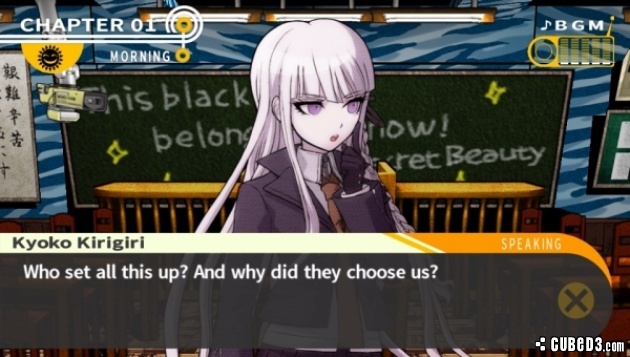Danganronpa: Trigger Happy Havoc (PS Vita) Review
By Az Elias  03.03.2014
03.03.2014

Prior to the two-company merger that formed Spike Chunsoft, the latter half, Chunsoft, came out with a pair of beloved (if brutal) visual novels as entries in the later-branded Zero Escape series - 999: Nine Persons, Nine Hours, Nine Doors and Virtue's Last Reward. Meanwhile, Spike had delivered its own murder mystery adventure to the PSP back in 2010, called Danganronpa. The merger now complete, Spike Chunsoft compiled the PSP game and its sequel into a single package for the PS Vita last year, with NIS America just recently bringing the remake of the first game to grateful Western hands. As the current status of the eagerly-awaited Zero Escape 3 is publicly known to be on hold, Danganronpa: Trigger Happy Havoc is the perfect substitute for visual novel enthusiasts.
Hope's Peak Academy - where only the best students from around Japan get invited to study and graduate. Not just the best, though; the ultimate. That is, the ultimate in what they specialise in. Covering all sorts of popular and unusual talents, the fifteen students called up to get schooled at this fine establishment that guarantees they will be set up for life include: the Ultimate Swimming Pro, the Ultimate Biker Gang Leader, the Ultimate Gambler, the Ultimate Fanfic Creator, the Ultimate Pop Sensation and the Ultimate Baseball Star. As is pretty clear, these are no ordinary classmates - they are hand-picked because they are the best at what they do, and they make up a really peculiar and brilliant cast.
Of these fifteen boys and girls is the Ultimate Lucky Student, Makoto Naegi, who was selected for Hope's Peak through a random lottery - hence his title. He is the main character in Danganronpa, and this bizarre sequence of events begins when he and his classmates start their new life in this proclaimed school. Falling unconscious after walking through the gates, and waking up to find that it has been completely locked down, with windows blocked up and doors secured, this ultimate bunch meet Monokuma, a half cute-half psycho talking bear, that claims to be the headmaster of the school. Freaking the students out completely, he forces them into a cruel game of death; in order to leave the academy and see the outside world again, students must murder one of their classmates and get away with it. As Monokuma presents the group with motives to get the killing going, it becomes too hard to resist, and the nightmare begins…
Of course, as a visual novel, it goes without saying that there is a large amount of text involved. Like 999 and Virtue's Last Reward, an awful lot of time is spent reading rather than really 'playing.' Anyone new to the visual novel concept needs to understand exactly what to expect, and it can take some time to get going on the gameplay side of things. Even once Makoto is free to run around, that's mostly all he is really doing, until the actual class trials begin each time.
Visual novels aren't going to be for everyone because of this, but when it comes to it, Danganronpa is one of best examples of its genre to make it to the West, with an enthralling story that simply cannot be put down for the entirety of the 30 to 40 hours it takes to see it through.

Split into a number of chapters, with each one focusing on different murders, Makoto is able to explore the school to gather clues at the scene of the crime and other places of interest, but only after long sequences of narrative have played out. Once a killing has taken place, the playing starts. In a first-person viewpoint, Makoto can dart around freely, using a cursor to highlight objects and examine them. All of the important facts and evidence are gathered up in a tidy menu for safe-keeping. This is all done during the investigation period granted to the students before they participate in the class trial to determine 'whodunit.'
With all the necessary evidence obtained, the class trial begins, with the students needing to present everything they know in order to uncover the murderer and condemn him or her to death, instead of the rest of them if they accuse the wrong person. At this point, the engaging part of the game plays out in a number of ways through quick-firing mini-game events, and some fast-thinking is needed to succeed.
As the debate gets underway, students will fire facts, accusations and lies across the room, so Makoto needs to find the contradictions and shoot them down. The Nonstop Debate is the most common format of gameplay during the trial, where a reel will play out with classmates giving their views on the crime, but contradictions in the form of 'weak points' will appear in yellow text. Makoto needs to find the correct Truth Bullet that contains the evidence to shoot down the contradiction or lie. As the game progresses, many weak points will begin to appear, and the option to choose what Truth Bullet to use will open up, making the Nonstop Debates that bit more difficult.

A shooting puzzle gameplay style called Hangman's Gambit and a rhythm-based sequence known as Bullet Time Battle make up two other unique sections of the trial. As the debate draws to a close, the Closing Argument features a comic strip that portrays exactly how the crime played out, with the correct images that are missing needing to be placed in the right order to solidify the judgement. Mistakes cannot be afforded, as there is an Influence meter that goes up and down depending on whether incorrect statements are submitted or not. Plus, there is a time limit constantly ticking down, meaning dawdling can be punished.
The class trials are fast and frantic, with some mini-games better than others, but the whole event is extremely amusing to see play out. Sometimes it is easy to determine what evidence to present and weak points to hit, but there is the case for the opposite, too, where it really isn't known who the real culprit is, even when a great deal through the debate already.
Between trials and the investigating of crimes, students are given free time to do what they wish, and it is at this point that Makoto is able to interact with his friends. By wandering the school and speaking to any classmate, time can be spent with them for a brief period so that Makoto can get to know them better and understand them that little bit more. With every character in the game having their own extremely unique personality, each one has something different to share, and naturally, certain ones will be liked a lot more than others. Thinking back to Persona 4, the relationship-building in Danganronpa is more of a stripped down version of the Social Link feature of Atlus' role-playing game.
Rewards are given for speaking to characters further as the days go on, but these are only new skills and points to equip more of them to help out in the class trials. There aren't any options to take things to different levels with certain characters, like becoming more than just friends with someone. Although, the whole murder game thing and not knowing who might go next may be a factor in why that wasn't possible. However, the potential for extra funny or flirty scenes might have been an option with some decision-making thrown in there, like hitting the hot tub with burly martial artist Sakura, or hanging out with Hina to scoff her favourite doughnuts. Marvellous-looking still images are used during many points in the story, so some exclusive ones that could only be found through the developing of relationships could have been a great idea.

Despite the limited gameplay and possibilities to explore more outside of the main plot, the story is extremely gripping. The most apparent aspect is just how sadistic it all is. Monokuma, and indeed so many of the characters, can be hilarious, but this black and white little bear is one messed up individual. The further the game advances, the more depressing and awful everything becomes. Danganronpa really pulls at the heartstrings on occasion, to the point that the anger felt from Makoto and his friends works its way through to the player. There is a constant worry about whether favourite characters will meet their demise, and some may even find the whole event very difficult to endure. It is almost impossible to put down, though, and uncovering the truth and wanting to put an end to the affair grows into a strong determination, mainly because it is so difficult not to want to save this great group of characters from the evil predicament they are in.
Danganronpa is designed to contrast these dark moments to lighten the mood, though. This is evident in not just the jokes, but also the graphical style. A colourful pop-up picture-book kind of setting is used to fantastic effect, and the characters evoke all kinds of emotion through the wonderful 2D art. This is further enhanced through great voice acting, which ultimately creates a fantastic cast of characters that can be related to, and an equally quality story.
Even knowing to expect a lack of gameplay in a visual novel, though, there is just the feeling that Danganronpa could have done with a little bit more interactivity. The Zero Escape series had lots of puzzle sequences that broke up the lengthy dialogue, and despite Danganronpa letting Makoto run around at many points to gather clues and develop character relations, and even with the class trials being the main gameplay feature, if there was perhaps just something else outside of the narrative to offer further player engagement, that may have won the game more points. Either way, Danganronpa: Trigger Happy Havoc goes straight in as being one of the most absorbing and unforgettable visual novels to date.

Cubed3 Rating
Exceptional - Gold Award

Danganronpa: Trigger Happy Havoc is an absolute treat, and a much-needed welcome addition to the visual novel genre in the West. Sadistic, emotional and sympathetic, yet humorous, relatable and utterly engrossing from the first moment to the last; Danganronpa is an impacting story of horror told through superb writing and characters. Perhaps more could have been done to make the game that little bit more interactive, and further develop relationships with other students for better rewards, but even so, Spike Chunsoft has produced an indelible murder mystery game, of which its sequel is passionately looked forward to.

![]() 9/10
9/10
![]() 9/10
(2 Votes)
9/10
(2 Votes)
 Out now
Out now  Out now
Out now  Out now
Out now  Out now
Out now Comments
Comments are currently disabled

 Sign In
Sign In Game Details
Game Details Subscribe to this topic
Subscribe to this topic Features
Features







 Top
Top

